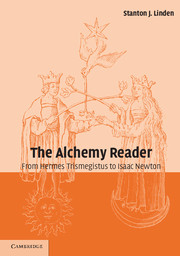Book contents
- Frontmatter
- Contents
- List of illustrations
- Acknowledgments
- List of abbreviations
- Illustrations
- Introduction
- Part I Ancient texts
- Part II Islamic and medieval texts
- 10 KHALID IBN YAZID (635-c. 704): From Secreta Alchymiœ
- 11 JABIR IBN HAYYAN (eighth century)/PSEUDO-GEBER (thirteenth century): From Of the Investigation or Search of Perfection; Of the Sum of Perfection; and His Book of Furnaces
- 12 AVICENNA (c. 980-1037) De Congelatione et Conglutinatione Lapidum
- 13 ALBERTUS MAGNUS (1193? or 1206?–1280): From the Libellus de Alchimia
- 14 ROGER BACON (c. 1219–c. 1292): From the Radix Mundi
- 15 NICOLAS FLAMEL (1330?–1417?): From His Exposition of the Hieroglyphical Figures
- 16 BERNARD, EARL OF TREVISAN (fl. late fourteenth century): A Treatise of the Philosopher's Stone
- 17 GEORGE RIPLEY (1415–1490): The Epistle of George Ripley written to King Edward IV
- Part III Renaissance and seventeenth-century texts
- Glossary
- Bibliography
- Index
17 - GEORGE RIPLEY (1415–1490): The Epistle of George Ripley written to King Edward IV
Published online by Cambridge University Press: 05 October 2014
- Frontmatter
- Contents
- List of illustrations
- Acknowledgments
- List of abbreviations
- Illustrations
- Introduction
- Part I Ancient texts
- Part II Islamic and medieval texts
- 10 KHALID IBN YAZID (635-c. 704): From Secreta Alchymiœ
- 11 JABIR IBN HAYYAN (eighth century)/PSEUDO-GEBER (thirteenth century): From Of the Investigation or Search of Perfection; Of the Sum of Perfection; and His Book of Furnaces
- 12 AVICENNA (c. 980-1037) De Congelatione et Conglutinatione Lapidum
- 13 ALBERTUS MAGNUS (1193? or 1206?–1280): From the Libellus de Alchimia
- 14 ROGER BACON (c. 1219–c. 1292): From the Radix Mundi
- 15 NICOLAS FLAMEL (1330?–1417?): From His Exposition of the Hieroglyphical Figures
- 16 BERNARD, EARL OF TREVISAN (fl. late fourteenth century): A Treatise of the Philosopher's Stone
- 17 GEORGE RIPLEY (1415–1490): The Epistle of George Ripley written to King Edward IV
- Part III Renaissance and seventeenth-century texts
- Glossary
- Bibliography
- Index
Summary
George Ripley is the best known English alchemist and alchemical author of the late medieval period. Although a canon regular of the Augustinian priory at Bridlington in Yorkshire, he travelled extensively on the Continent in search of alchemical knowledge (“Great secrets … in farre countries I did learne,” Epistle, st. 3) and supposedly laid the foundations for attainment of the philosopher's stone while studying in Italy. That Ripley was reputed to be successful is evident from the widely circulated account of his stay on the island of Rhodes where he was a guest of and a lavish contributor to the Knights of the Order of St John of Jerusalem.
A vast amount of Ripley material exists in manuscript, indicating that he was prolific and that his works were widely disseminated and highly regarded; in addition, his writings appeared in printed editions into the eighteenth century. Chief among his works is The Compund of Alchymy, a long alchemical poem written in rhyme royal and dedicated to King Edward IV. In it, Ripley purports to reveal the process for making the philosopher's stone through detailed discussion of each of its twelve stages or “gates.” This work was first printed in 1591, 120 years after its composition, and also reprinted in Elias Ashmole's Theatrum Chemicum Britannicum (1652). Ripley's importance was recognized throughout the seventeenth century, as he is frequently cited by Robert Boyle and Isaac Newton, and the Compound received detailed commentary in Eirenaeus Philalethes’ (i. e. George Starkey's) Ripley Reviv'd (1678).
- Type
- Chapter
- Information
- The Alchemy ReaderFrom Hermes Trismegistus to Isaac Newton, pp. 141 - 148Publisher: Cambridge University PressPrint publication year: 2003



